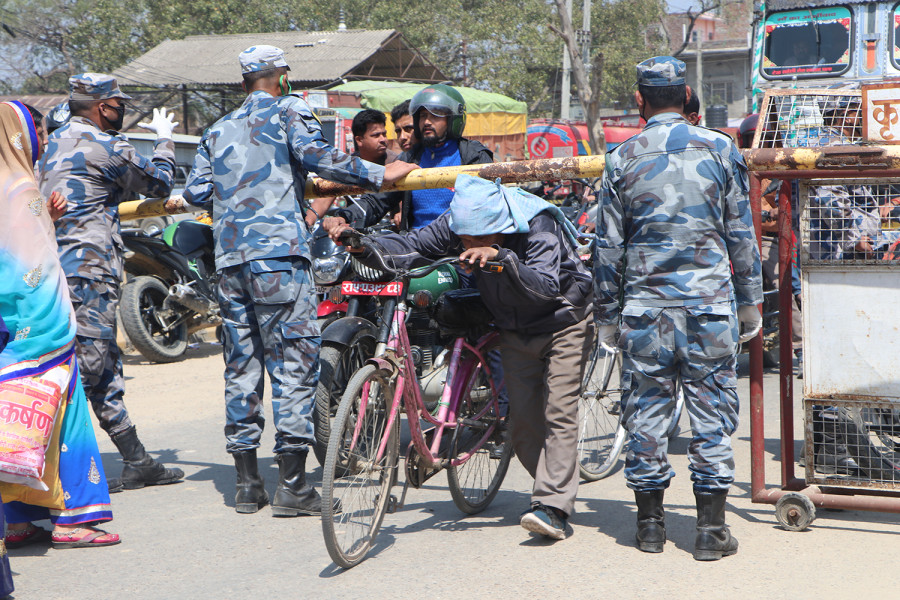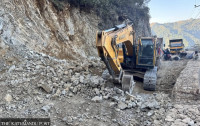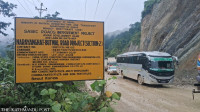National
Despite the government’s move to close all border points except four, small border points open for human movement in province 5
Major border points have health desks set up to screen footfall, most health desks are ill-equipped and under-staffed.
Madhav Dhungana
Movement of people through small border crossings with India in Province 5 has not stopped despite the decision to close all small border crossings to stem the possible spread of coronavirus.
In Province 5 alone, there are nearly 18 small border crossing points between Nepal and India from where people are moving freely. While the authorities are keeping record of the people entering through the Bhairahawa-Sunauli border—one of the four main border crossings that the governments of Nepal and India have agreed to keep open—no such precautionary measure is taking place at small border crossings.
On Tuesday, a group of six Nepali students who entered Nepal through the Krishnanagar border point in Kapilvastu refused to have their temperature taken with a digital thermometer at the health desk established at the border.
When the health personnel told the students that they would not be allowed to enter the country without getting tested for temperature, the students began chanting protest slogans.
The situation calmed only after the health desk brought a thermal temperature device to take the students’ temperatures.
Auxiliary health workers Ahmad Khan and Nabin Prasad Dangi, both deployed at the Krishnanagar border point, to screen the people entering the country, say the health desk lacks the equipment to test people for coronavirus symptoms without putting them at infection risk. The health professionals themselves are also at risk as they lack protective gear.
“We had to buy masks with our own money since the local administration did not provide us with one,” said Khan.
Hathihawa, Dohani, Rangapur, Hadauna and Kushahawa are some of the villages in Kapilvastu that share border with India.
In Bhairahawa-Sunauli border, stringent measures have been put on place by both sides to prevent the Covid-19 from spreading, but just 2km away at the border crossing at Danda River, the situation is very different. The bi-weekly market on the Indian side which primarily sees Nepali consumers is still in operation.
Known as the Ferena Bazaar, Nepalis and Indians throng the market in thousands to buy daily essentials.
“We have heard about the virus in our village but don’t know much about it. No one has told us it is unsafe to travel to a crowded marketplace,” said Sita Karki of Suddhodan Rural Municipality. She and three of her neighbours were returning from the Indian market after buying daily essentials.
Meanwhile, some border towns in India are reportedly organising fairs targeting the Nepalis returning home in droves due to coronavirus fears. Likewise, the number of Nepalis going to such fairs in India to shop for daily essentials has also gone up with the decision to close small border crossings.
Local administration on the Nepal side does not seem concerned over the high flow of people through the border. There are several health desks, but they are understaffed and under-equipped to monitor the travellers.
"We don't have any personal protective equipment such as protective suits, medical goggles, boots, gloves, and masks. Without them we are exposed to the threat of contracting the virus," said Khan, auxiliary health workers at the Krishnanagar border.
The measure of social distancing to limit the spread of coronavirus is not being followed in border towns and villages of both Nepal and India.
Man Kumari Gharti of Rolpa who was on her way to India with her family said he was more concerned about feeding his family than coronavirus.
“The Indian side has been blaring out messages about the dangers of coronavirus but an empty stomach doesn't care much about any virus”, she said. “We are more concerned about dying of hunger than the virus.”
Jagbir Buda of Surkhet also has a similar view about the coronavirus crisis.
He, too, was travelling to India after visiting a sick relative.
“While others are returning, I am going back. What options do I have if I stay here?” said Buda, whose entire family is in India for work.
“I don't care about getting the virus. All I know is we have lived together and will die together if we contract the virus.”
Chief District Officer of Kapilvastu Dirgha Narayan Poudel said they were preparing to close all small border crossings.
In Nawalparasi, too, cross-border movement of people remains uninterrupted despite the travel advisory issued by the local administration.
“We have appealed to the people to avoid non-essential travel and increased monitoring along the border. But there has not been much effect on the movement of people,” said Chief District Officer Basudev Dahal.
In Bardiya, the local administration has not taken any steps to close the border crossings with India despite the threat of Covid-19.
Chief District Office Prem Lal Lamichhane said his office did not have the authority to close the border with India.
"All we can do is urge people to avoid non-essential travels. We do not have the authority to close the border," said Lamichhane.
The local administration of Banke also said that the decision to close down the border should come from the higher authority.
“We are trying to contain the risks by discouraging people from travelling to India unless absolutely necessary. We cannot stop them from travelling at all," said Chief District Officer Kumar Bahadur Khadka.
The district’s border screening measure is also lax.
At the Jamunaha border point, the health desk set up by the local administration is severely understaffed and under-resourced. The health desk has only six staff compared to 20 on the Indian side.
"We are the ones with the highest risk of contracting the disease and we have no protective gear,” said Dhan Prasad Neupane, a health worker deployed at the health desk, which has so far referred five suspected coronavirus patients to Bheri Hospital.
Meanwhile, the hospital itself is woefully underprepared to handle coronavirus cases.
"There are no facilities in the isolation wards. We don't have the facility or personnel to even take the samples from the suspected person and send them to the Capital for further testing," said Dr Prakash Bahadur Thapa, medical superintendent at the hospital. "Even if we confirm someone with Covid-19, there is nothing we can do to treat the person."
The health desk set up by the Rupandehi local administration at Suthauli border point is also not up to the mark to screen the travellers for possible coronavirus inspection.
The health desk is being manned by only two health workers. They usually come at 10 am and leave after 4 pm. All movements before 10am and after 4pm are not monitored.
Chief District Officer Yogendra Bhagat said they have written to the supplies department of the provincial government to dispatch proper equipment at the border point.
"These equipment are single-use materials. They cannot be reused. But the administration has not sent us supplies," said Bhagat.
(Thakur Singh Tharu from Bardiya, Madhu Shahi from Banke, Manoj Poudel from Kapilvastu, Madhav Dhungana from Rupandehi and Nabin Poudel from Parasi contributed to this reporting.)




 14.12°C Kathmandu
14.12°C Kathmandu














